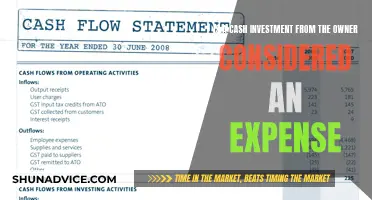
Cash investments are a way to put your money in a stable, low-risk place while earning a higher return than physical cash. Cash investments are highly liquid and can be easily converted into short-term assets. They are typically short-term obligations, with a maturity period of less than 3 months. Cash investments generally carry a low rate of interest but have a comparatively low rate of risk when compared to other modes of investment. Examples of cash investments include savings accounts, money market accounts, and certificates of deposit.
| Characteristics | Values |
|---|---|
| Risk | Low |
| Returns | Low |
| Liquidity | High |
| Accessibility | High |
| Maturity | Short-term |
| Examples | Money market accounts, certificates of deposit, savings accounts, fixed-income bills, short-term U.S. Treasury securities |
What You'll Learn

Low-risk, high-liquidity, short-term investments
Cash investments are a great way to keep your money in a stable, low-risk place while earning a higher return than physical cash. They are also a good way to protect against inflation, which can decrease the value of cash over time.
Money Market Accounts (MMAs)
MMAs are a good option for those seeking a temporary place to keep their cash while researching other investment products. They are very liquid investments that pay variable interest rates, generally higher than a cash savings account. MMAs also offer checking account features such as check-writing privileges, debit cards, and ATM access.
High-Yield Savings Accounts
While not technically an investment, high-yield savings accounts offer a modest and safe return on your money. They are government-insured, protecting your principal and interest up to a certain amount. They are also easily accessible, allowing you to make deposits at any time.
Short-Term Certificates of Deposit (CDs)
CDs are stable investments that are federally insured, making them a safe option. They offer a set rate of interest over a specified term, usually a few months to a few years. However, withdrawing money early from a CD will typically result in a penalty.
Treasury Bills, Notes, and Bonds
Treasury bills, notes, and bonds are highly liquid securities that can be bought and sold directly or through mutual funds. They are considered low-risk, but their value will fluctuate with interest rates. Treasury bills have a short maturity of within a year, while notes and bonds mature in up to 10 and 30 years, respectively.
Money Market Funds
Money market funds are pools of CDs, short-term bonds, and other low-risk investments that are sold by brokerage firms and mutual fund companies. They are liquid, allowing you to withdraw funds at any time without penalty, and they usually offer a stable value per share.
These investment options provide a great balance of low risk and high liquidity for your short-term investment needs.
Cash App Investment Options: Where to Put Your Money
You may want to see also

Cash investments vs physical cash
Cash investments are short-term financial instruments that are readily available and provide high liquidity, minimal market risk, and a maturity period of less than three months. They are designed to be a stable, low-risk place to put money, earning a higher return than physical cash while preserving the liquidity of cash. Cash investments include products like cash management accounts, money market funds, and certificates of deposit (CDs).
Physical cash, on the other hand, is money that is not invested in the markets and is easily accessible. It has little to no market risk and can be used for everyday transactions and short-term financial goals. However, physical cash does not provide any returns and is subject to inflation, which can decrease its value over time.
One of the main advantages of cash investments over physical cash is the potential for higher returns. Cash investments can provide slightly higher returns than traditional savings accounts, helping individuals keep up with inflation. Additionally, cash investments offer liquidity, allowing investors to access their funds quickly. This combination of modest returns and accessibility makes cash investments attractive for short-term financial goals and emergency funds.
However, cash investments may not be suitable for long-term investment strategies. While they provide low risk and stable returns, they may not offer enough growth to outpace taxes and inflation over an extended period. As a result, individuals with long-term investment horizons may consider allocating only a small portion of their portfolio to cash investments, focusing instead on investments with higher growth potential, such as stocks and higher-yielding bonds.
In summary, cash investments offer a stable and low-risk option for individuals seeking to earn modest returns while maintaining liquidity. They are particularly well-suited for short-term financial goals and emergency funds. However, for long-term investment strategies, cash investments may need to be complemented with other types of investments to achieve sufficient growth and meet future financial goals.
Cashing Out Investments: Using the Cash App to Withdraw Funds
You may want to see also

Cash accounts
In a cash account, an investor must pay for the purchase of a security before selling it. If an investor buys and sells a security before paying for it, they are "freeriding", which is not permitted under Regulation T and may require the investor's broker to "freeze" the investor's cash account for 90 days. During this 90-day period, an investor may still purchase securities with the cash account, but they must fully pay for any purchase on the date of the trade.
Some examples of cash accounts include:
- Money market accounts (MMAs)
- Certificates of deposit (CDs)
- Checking accounts
- Savings accounts
- Money market funds
Understanding E-Trade Cash Calls: What Investors Need to Know
You may want to see also

Money market instruments
- Money market mutual funds (MMMFs)
- Commercial paper
- Treasury bills
- Repos
- Bank deposits
- Interbank loans
- Certificates of deposit
Money market mutual funds are securities offered by companies that invest in other money market instruments. They are regulated as investment companies in the United States and the European Union. Money market mutual funds offer low-risk returns on short-term investments to retail and institutional investors, as well as corporations.
Commercial paper is a promissory note (an unsecured debt) issued by highly-rated banks and some large non-financial corporations. It is issued and traded like a security, but because it is short-term and not purchased by retail investors, it is exempt from most securities laws.
Treasury bills are issued by the government and are securities with maturities of less than a year. They are actively bought and sold and are considered one of the safest instruments for short-term savings.
Repos, or repurchase agreements, are part of the overnight lending money market. Treasury bills or other government securities are sold to another party with an agreement to repurchase them at a set price on a set date.
Bank deposits are not considered securities, even though certificates of deposit are sometimes traded like securities.
Interbank loans are not secured by collateral, so a lender looks exclusively at a borrower's creditworthiness to assess repayment probabilities.
Understanding Cash Flow: Investing Activities Explained
You may want to see also

Savings accounts
There are several types of savings accounts, including traditional savings accounts, high-yield savings accounts, money market accounts (MMAs), certificates of deposit (CDs), cash management accounts, and specialty savings accounts. Traditional savings accounts are the most common type, typically found at traditional banks or credit unions. These accounts generally allow you to earn interest on your money, although the interest rates are usually lower compared to other savings options. High-yield savings accounts, on the other hand, offer a higher annual percentage yield (APY) and can be found at online banks, neobanks, and online credit unions.
Money market accounts (MMAs) combine features of a regular savings account with those of a checking account. They allow you to earn interest on your savings, with rates that are often better than traditional savings accounts and sometimes similar to high-yield savings accounts. Certificates of deposit (CDs) are time deposits where you agree to leave your money in the account for a set period, during which it earns interest. Cash management accounts, offered by online brokerages and robo-advisor platforms, are not specifically designed for saving but allow you to hold cash that you plan to invest.
Specialty savings accounts are tailored to specific savings goals, such as education, retirement, or healthcare savings. They can also be intended for a specific type of person, such as minors or students.
When choosing a savings account, it's important to consider your financial goals and needs. Some factors to consider include the interest rate, fees, accessibility, and tax advantages of the account. Additionally, you may want to have multiple savings accounts for different purposes, such as an emergency fund or short-term goals.
Uncertain Future Cash Flows: Navigating Investment Project Analysis
You may want to see also
Frequently asked questions
A cash investment is a short-term, low-risk way of storing money that provides liquidity and earns a higher return than physical cash.
Examples of cash investments include savings accounts, money market accounts, and certificates of deposit (CDs).
Cash investments behave similarly to cash but can earn slightly higher returns. They are often used to reduce the risk of inflation and can be accessed through financial institutions like banks.
Cash investments are a safe way to store cash and earn a slight return. They provide liquidity and are useful for those who want to minimise risk while earning a modest return.
Cash investments generally offer a low return compared to other investments. They may not be suitable for those seeking higher returns or for meeting long-term goals.







